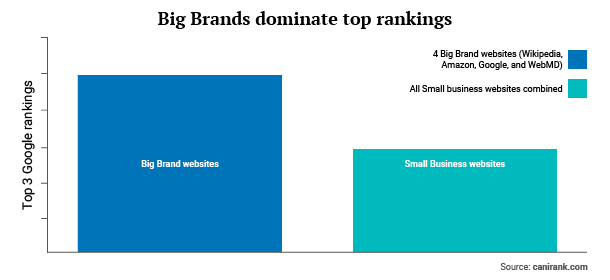How Google Stacks the Deck Against Startups and Small Businesses Amazon may outrank your small-business website, but it can't connect with your customers like you can.
By Matt Bentley •

Opinions expressed by Entrepreneur contributors are their own.

Imagine you're an entrepreneur who's just written a comprehensive, well-researched and entertaining article about a topic in which you have decades of experience. Meanwhile, a freelance writer, new to your industry, spends 20 minutes writing an 8-sentence description for an Amazon product page.
Surely Google will rank your article higher, right? After all, Google reps never waste an opportunity to remind us that the key to high rankings is simply writing great content. However, according to new research, the bar for "great content" is a lot higher for small-business websites than it is for larger, well-known brands like Amazon, Walmart, Yelp or eBay.
Related: This Ingenious PR Strategy Will Improve Your SEO
Big brands dominate online and off.
Many search engine results increasingly look like the online equivalent of a big-box strip mall, where the same 5 or 6 companies dominate everywhere you look. Amazon alone ranks for almost 70 million commercial keywords, from "fidget spinner" (5,000,000 monthly searches) to "dog walking devices" (10 monthly searches).
Are Amazon, Walmart, Yelp, eBay and other megasites really so much better at creating content than smaller companies, or is there something else going on here?
I've spent the past decade helping small businesses and startups rank in search engine results, and in my experience, not only is Google's big-brand bias real; there's evidence it's getting worse.
Machine learning systems like RankBrain encode human biases towards recognizable brands into Google's algorithm, making it increasingly difficult for smaller sites to compete.
How much easier is it for big brands to rank?
To assess just how slanted the Google playing field has become, we used CanIRank's SEO Competitor Analysis software to collect hard data on more than 30,000 high ranking URLs to see how the characteristics of big brand pages compare to ranking pages from small businesses.
The results were striking:

- Just four big brand websites -- Wikipedia, Amazon, Google and WebMD -- nabbed more top three Google rankings than all of the small business websites in our data set combined.

- Ranking pages on big brands were 3.3 percent less relevant than ranking pages on small sites.
- In order to rank in the top three, small-business websites needed greater topic expertise than big brands (12.5 percent higher topical relevancy).
- The pages on small-business websites needed 14 percent more content to reach the first page of results.

- Small sites scored almost twice as high on website relevancy, meaning they have more content focused on that specific topic.
- More than 56 percent of small businesses needed to use their home page to rank, while only 5 percent of big brands did.

Big-brand pages ranking in the top three were:
- 220 times more likely to split the content over multiple pages in an annoying slideshow
- 73 times more likely to have autoplaying video ads
- 4 times more likely to have a page takeover/ lightbox popup
Related: 10 Tweaks That Can Boost Lagging Articles Onto Google's First Page
A double standard for content quality.
For some keywords, Google's preference for big brands was particularly egregious. Amazon ranks no. 1 for "massage table," with a single product listing offering less than 200 words of error-riddled content so poorly written that it's painful to read: "Our table legs thicker very sturdy, Double knobs on legs… Use the same steel used for auto brake for wire."
Meanwhile, one of our clients is a leading seller of massage tables online with dozens of pages of well-written educational content, informative graphics, original research and buyer's guides. They rank on page 2, below a slew of vapid pages from Walmart, Costco, eBay, Sears and Sam's Club.
If you search "fairy garden," the no. 1 result will give you an ad-riddled slideshow with one sentence including 15 examples lifted from other peoples' websites. But you'll have to go all the way to page 3, past catalog pages from big-brand stores like Big Lots and Jo-Ann's, before you reach niche experts FairyHomesAndGardens.com and FairyGardening.com, two of the leading fairy garden sites.
Google's big brand bias is not just limited to ecommerce. Page 1 results for "best SEO software for small business" include a Business.com article that inexplicably recommends a dashboard tool, a PPC tool and a social media tool as the best SEO software options for small businesses. You'll have to go to page 2 if you want to find actual SEO software. Perhaps that explains why the Business.com writer didn't manage to find many for their article?
Related: 6 Sneaky Ways Your Competitors Are Keeping Ahead of You
How small businesses can still win.
Fortunately for small businesses and startups, there are still ways to rank well if you're willing to dive deeper into SEO than "make great content." You'll never compete with Amazon on authority, so you need to beat them in other areas.
One of the most effective strategies is to focus on building your topical expertise. Google wants their search results to include both highly authoritative generalist sites like Amazon or Wikipedia and niche specialists who may be smaller but are highly focused on covering a single topic much more thoroughly. You establish your superior niche expertise by keeping your website content tightly focused on a handful of key themes, and building off-site relevancy via thought leadership and contributions to closely related sites.
No big brand can manufacture the authenticity and personal experience of a passionate entrepreneur. You may not be playing SEO by the same rules as large websites, but you can still win with a strategy that connects to your customers in ways that big brands can't match.











